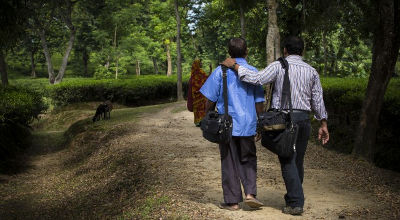Ministering to Bangladesh Tea Garden Workers
If Jesus lived in the 21st century, He’d have ridden a motorcycle.
Well, at least Pavel Mitra* thinks so. He’s a Bangladesh native who spends his time starting churches and witnessing to tea garden workers.
“If Jesus’ time was right now, he’d use a motorcycle,” Mitra speculates as he leans back in the van carrying him and a group of believers along bumpy Bangladeshi roads.
A motorcycle is how Mitra himself usually gets around, scooting down dirt paths so he can tell tea garden workers about Jesus.
On this day, Mitra travels to meet a close friend and ministry partner, Bashkar Verma.*
Verma used to work in a tea garden himself, and was the first believer in the area. He now lives on the outskirts of a tea estate and partners with Mitra to spread the Gospel.
“From the beginning to today, we are having good relationship. It should continue up to the end of our life,” Verma says.
Mitra couldn’t agree more.
“We ate together, we talk together; we share the Gospel together,” Mitra says.
Tea Workers Lack Money and Hope
As the evening sun sinks into the horizon, men and women slowly find their way out of the maze of closely cropped tea trees. Some carry their last load of freshly plucked tea leaves for weighing.
Mitra and Verma walk side-by-side down the path to visit the homes of tea estate workers.
These evangelists say they typically spend time with tea garden workers in the early evenings, after the day’s work is done.
This kind of work and the tea estates themselves are vestiges of English colonialism – a period when the British East India Company was king and Indians and Bangladeshis were the subjects.
Though both India and Bangladesh are now independent nations and the estates are mostly owned by locals, the lives of the tea estate workers haven’t changed with the tides of time and democracy.
The tea garden workers live in estate-owned housing, mud homes with no electricity or running water. Virtually everything the workers have belongs to the tea estate, which also keeps much of the workers’ money.
Their lives and surroundings are reminiscent of an 1800s slave plantation in the American South, according to Finn Aurora,* an IMB agriculturalist and friend of Mitra.
The men and women who work on the estate in Bangladesh are low-class Hindus. The British brought them to Bangladesh from India to work on the tea estates. Their language, religion and culture differ from the majority of people in Bangladesh who are Muslim and Bangla speakers.
The workers make between 52 and 64 cents a day. If the workers were to leave this life, Mitra says, they’d leave with the clothes on their back and a few cents in their pockets.
There’s a palpable lack of hope here, and a desperate need for Jesus. Through Mitra and Verma’s witness, many are finding the hope they crave.
The Sounds of Children Laughing
When Mitra walks into villages, children instantly surround him.
“I got a gift from God to make friends with children,” Mitra says, shrugging. “I don’t know why, but they love me.” It’s true – the minute he enters a village, children seem to find him and before long, they are laughing at his jokes.
After joking and playing with the kids, he asks to meet their parents. He says this allows him to build friendships that lead to God-centered conversations.
Mitra isn’t always met with open arms. He recently received a threatening phone call after visiting a tea estate.
“It could be harmful for you if you return,” the voice said.
“Come sit with me and have a cup of tea,” Mitra asked the caller.
The man hung up on him.
“I don’t fear man, I fear God,” Mitra says.
Courage and confidence in Christ lead both men to minister in the tea gardens of Bangladesh.
Mitra has baptized more than 300 people during his years of ministry. Verma says he’s led 100 people to the Lord.














































